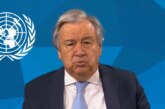
(FGR Bureau)
A five day meeting was organized by the United Nations Economic and Social Commission for Asia and the Pacific (ESCAP) Pacific Office, and the Pacific Financial Technical Assistance Centre (PFTAC) in Nadi, Fiji in the second week of November 2015 in which analysts and budget planning officers from the Cook Islands, Marshall Islands, Federated States of Micronesia, Nauru, Niue, Palau and Samoa came together to enhance medium-term expenditure planning as a tool for achieving national sustainable development.
The meeting focused on improving medium-term budgeting links with national development plans. Participants discussed enhancing the policy content of budget narratives for critical public services, improving the quality of government spending; and managing fiscal risks including setting aside adequate resources for asset repair and replacement and debt repayment.
Iosefa Maiava, Head of the ESCAP Pacific Office, in his address to the meeting said that public expenditure, an important tool for governments to achieve national sustainable development, is enhanced by mainstreaming the 2030 Agenda for Sustainable Development into the national planning and budgetary processes.
Scott Roger, Coordinator PFTAC said: “Medium-term fiscal planning is essential for disciplined public financial management and sound macroeconomic policy. Assisting Pacific countries with the development of medium-term fiscal frameworks is a high priority for PFTAC.”
Critical issues were reflected on through presentations, group exercises and information sharing, and highlighted good practices, including the need for closer integration between planning and budgeting in an annually updated budget with a medium-term framework. Robust consultation, analysis of proposals, national agreement on priorities, and follow-up on progress were recognized as key to enhancing outcomes and improving the quality of expenditure.
Country participants identified many similar challenges which created the opportunity for learning from each other. They emphasized the need for a tailored approach to strengthen links between plans and budgets over the medium term, taking into account countries’ sector comparative strengths, demographics, risks, country specific vulnerabilities and capacities that shape opportunity costs and trade-offs of budgetary allocations.
Workshop participants proposed specific actions at national level and where necessary, will liaise with partner agencies for implementation support. In addition, guidelines on good practice for strengthening medium-term expenditure planning and better linking to national plans was called for to provide a resource for both national and development partner stakeholders.


